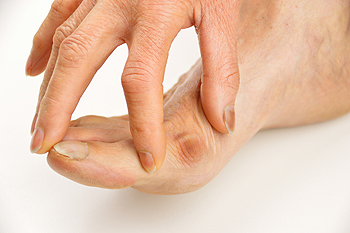North Andover (978) 686-7623
Tewksbury (978) 640-1010
Understanding Bunions
 One of the most common forefoot issues is a bunion. This occurs when there is a bump on the inside of the foot near the big toe joint and the big toe begins moving towards, and potentially overlapping with, the smaller toes. Another type of bunion that can occur is a tailor’s bunion, also known as a bunionette. A tailor’s bunion occurs on the pinky toe. While bunions can form due to issues with foot function, such as arthritis, improperly fitting footwear tends to be the most common cause. Shoes that are too tight and squeeze the toes together generally lead the first metatarsal bone to protrude on the side of the foot. Because of this, wearing shoes with a wide toe box is usually recommended. Those who are suffering from a painful bunion should visit a podiatrist for proper treatment. Treatment options may include orthotics, and in severe cases, surgery may be suggested.
One of the most common forefoot issues is a bunion. This occurs when there is a bump on the inside of the foot near the big toe joint and the big toe begins moving towards, and potentially overlapping with, the smaller toes. Another type of bunion that can occur is a tailor’s bunion, also known as a bunionette. A tailor’s bunion occurs on the pinky toe. While bunions can form due to issues with foot function, such as arthritis, improperly fitting footwear tends to be the most common cause. Shoes that are too tight and squeeze the toes together generally lead the first metatarsal bone to protrude on the side of the foot. Because of this, wearing shoes with a wide toe box is usually recommended. Those who are suffering from a painful bunion should visit a podiatrist for proper treatment. Treatment options may include orthotics, and in severe cases, surgery may be suggested.
If you are suffering from bunions, contact one of our podiatrists of Foot Health Center of Merrimack Valley. Our doctors can provide the care you need to keep you pain-free and on your feet.
What Is a Bunion?
A bunion is formed of swollen tissue or an enlargement of boney growth, usually located at the base joint of the toe that connects to the foot. The swelling occurs due to the bones in the big toe shifting inward, which impacts the other toes of the foot. This causes the area around the base of the big toe to become inflamed and painful.
Why Do Bunions Form?
Genetics – Susceptibility to bunions are often hereditary
Stress on the feet – Poorly fitted and uncomfortable footwear that places stress on feet, such as heels, can worsen existing bunions
How Are Bunions Diagnosed?
Doctors often perform two tests – blood tests and x-rays – when trying to diagnose bunions, especially in the early stages of development. Blood tests help determine if the foot pain is being caused by something else, such as arthritis, while x-rays provide a clear picture of your bone structure to your doctor.
How Are Bunions Treated?
- Refrain from wearing heels or similar shoes that cause discomfort
- Select wider shoes that can provide more comfort and reduce pain
- Anti-inflammatory and pain management drugs
- Orthotics or foot inserts
- Surgery
If you have any questions, please feel free to contact one of our offices located in North Andover, and Tewksbury, MA . We offer the newest diagnostic and treatment technologies for all your foot care needs.






